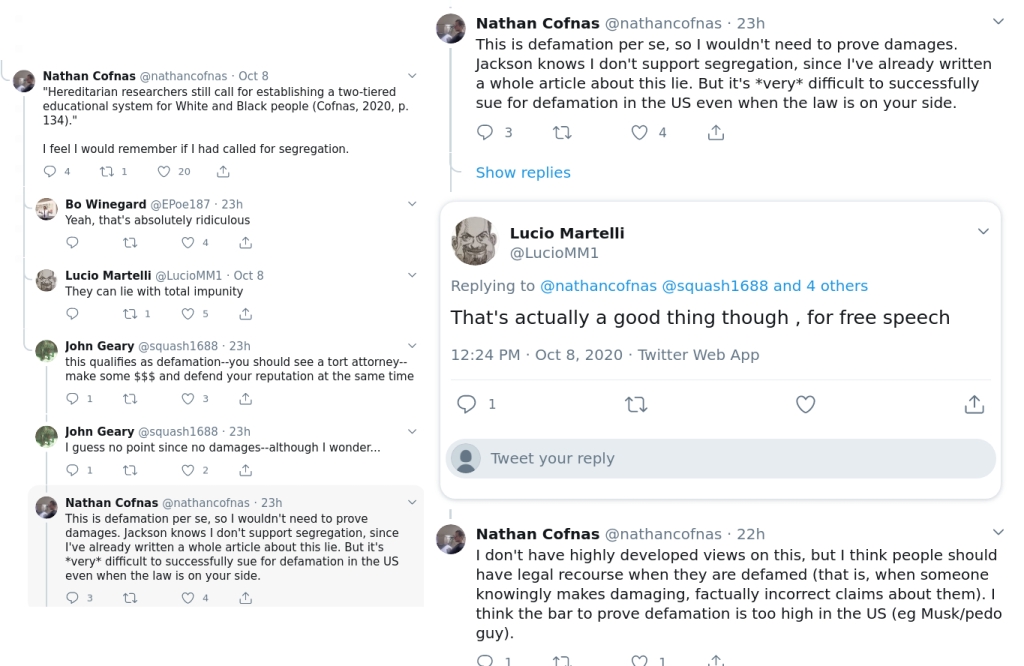
The paper Andrew Winston and I wrote* on the mythical taboo on race/intelligence research has caused a mini-stir over on Twitter. Nathan Cofnas is particularly upset, claiming I have defamed him. A polite word for Cofnas’s claim is “nonsense.” There are many impolite words that you could substitute for that one. Let me explain why.
Cofnas claims that I wrote he advocated racial segregation. He first made the accusation on Twitter and then wrote a blog post about it. He begins by objecting to this Daily Nous post and claims that I resurrected the idea that he was an advocate of racial segregation. But, here’s what I wrote:
Hereditarian researchers still call for establishing a two-tiered educational system for White and Black people (Cofnas, 2020, p. 134).
Cofnas writes: “John Jackson knew this was false because (a) it’s ridiculous and (b) he was aware of my article in Spectator USA, which explicitly addressed this lie. But now the claim that I advocate segregation has become the go-to smear on Twitter.”
Here’s the problem. The line that so offends Cofnas does not claim that Cofnas advocates segregation.” The sentence does not even attribute the “two-tiered” idea as one advocated by Cofnas, but one advocated by “hereditarian researchers” when they call call for a “two-tiered educational system for White and Black people.” Here is Cofnas making that exact claim:
![But the reason that these programs, which Kourany rightly says ought to exist, have never been created is not because of racism but because of the taboo on talking about genetic differences among policy makers. No mainstream politician can acknowledge that there are differences that might call for the creation of a program to “work with the strengths and work on the weaknesses of every [ethnic] group to help make them the very best they can be.” It is hereditarians who have advocated these programs and environmentalists who have resisted them. The abstract to Jensen’s (1969) paper –](https://fardelsbearblog.files.wordpress.com/2020/10/cofnas.png?w=880)
It could not be more clear that, in this quotation from Cofnas’s paper, he claims that hereditarians have advocated educational programs based on “ethnic” groups. He then cites the following scholars as evidence that hereditarians advocate such programs:
- Gottfredson, L. S. (2005a). Suppressing Intelligence Research: Hurting Those We Intend to Help. In R. Wright & N. A. Cummings (Eds.), Destructive trends in mental health: The well-intentioned path to harm (pp. 155–187). Routledge.
- Gottfredson, L. S. (2005b). What if the hereditarian hypothesis is true? Psychology, Public Policy, and Law, 11, 311–319.
- Jensen, A. R. (1969). How much can we boost IQ and scholastic achievement? Harvard Educational Review, 39, 1–123.
- Lubinski, D., & Humphreys, L. G. (1997). Incorporating general intelligence into epidemiology and the social sciences. Intelligence, 24, 159–201.
It is perfectly correct, therefore, to cite Cofnas’s paper to evidence the claim that hereditarians advocate a “two-tiered” system of education based on racial or, if you prefer, “ethnic,” groups. There seems to be ample evidence, supplied by Cofnas himself, that hereditarian researchers advocate for these kinds of programs. For a devastating critique of the idea that education should be tailored in such a way, see this wonderful post by Jonathan Kaplan.
Cofnas is spinning the idea that I claimed he advocated segregation out of whole cloth. I wrote an entire book about psychologists who did use their science to advocate for Jim Crow segregation–an ugly history that contemporary hereditarians pretend never happened. In that book, I made quite clear that Jensen disavowed the use of his research to support Jim Crow when arch-segregationist, Carleton Putnam attempted to recruit him to the cause:
![William Shockley was soon joined by a quieter and more sophisticated voice, Berkeley psychologist Arthur Jensen, whose 1969 article in the Harvard Educational Review claimed that white and black differences in IQ scores were genetic in nature and impervious to environmental modification. Even before his 1969 article Putnam was writing to Jensen, offering his services as a liaison between Jensen and high-level governmental officials. In 1968, Putnam noted how important it was for Jensen’s findings to be “rapidly disseminated and implemented as quickly as possible.”18 Jensen, however, maintained that nothing in his work lent any support to the racial segregation of schools. A few years after Jensen’s 1969 article was published, in long lunch meeting, Putnam “took pains to explain our view of the inconsistency of [Jensen’s] position on the existence of innate race differences when compared with his stand on school integration.” Jensen, however, was unmoved and continued to insist that his work did not lend support to the segregationist cause.19](https://fardelsbearblog.files.wordpress.com/2020/10/jensen_jim_crow.png?w=1024)
Of course, even while denying his work could support segregation, Jensen happily collaborated with them when he testified in front of Congress alongside segregationists, cited a neo-Nazi to define races in his 1969 article, and touted his eugenic fantasies for a notorious white supremacist website. Cofnas was silent when I pointed out that his work was praised at those white supremacist websites.
Hereditarians simply ignore the uses to which the radical right put their work. They prefer to take on the role of innocent victim and attack those who simply read and report on what they have written correctly.
*Andrew co-wrote the paper with me but the passage that offends Cofnas was mine and I take full responsibility for it. Andrew is not writing this blog which represents only my opinions, not his.
This work is licensed under a Creative Commons Attribution-NonCommercial-ShareAlike 4.0 International License.


